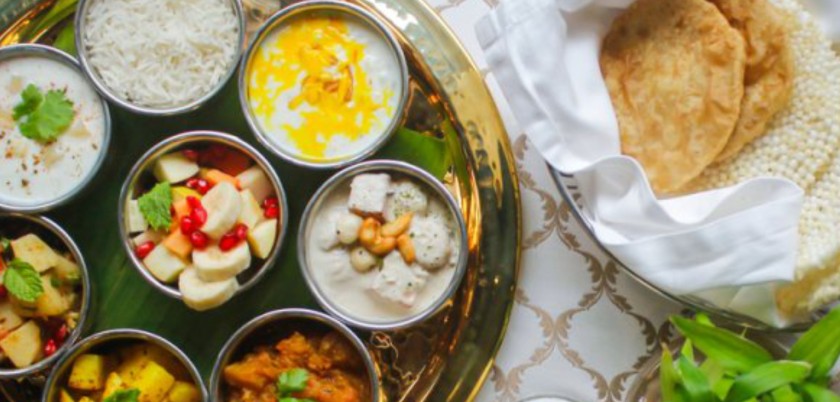
WELL BALANCED VRAT DIETS WITH IT'S DO'S AND DONT'S
Sharad Navratri’s season has begun again and the festival is celebrated in India with great zest and zeal. This time of the year is the seasonal change from autumn to winter, creating a need to boost the body’s immunity. Also the upcoming festive season creates an earnest desire to detoxify the body. Navratras fast do the perfect job to cleanse and rejuvenate the body, calm the mind and purify the soul.
Tips for healthy fasting-
Have small and frequent meals
Fasting doesn’t mean to starve yoursevesf. This fast’s purpose is to include superfoods in the diet that give a boost to the body’s immune system and are light for the gut. Have small, frequent and light meals. This helps to keep balanced energy levels and also prevents dropping of blood sugar levels.
Hydration is the key
Hydration is very important whenever you are fasting. Most of the times, when we feel hungry we are actually dehydrated. Along with this, dehydration makes a person feel lazy and lethargic, adding on to troubles. Keep sipping water, lemon water, coconut water, buttermilk etc. Along with water, electrolyte replenishment is also essential for the body.
Take vow to pair veggies with potato
Now, this is something important to understand. This fast allows the consumption of tuberous vegetables such as potato, sweet potato, colocasia etc. Having starchy vegetables alone will cause the blood sugar levels to spike up quickly. So, in order to balance the meal, have the fibrous vegetable along be it spinach, tomato, pumpkin.
Looking at way of cooking
Next tip is the balance of calories and nutrition by the way of cooking. The superfoods consumed in Navratra- buckwheat, amaranth, potato, sweet potato etc. are all loaded with vitamins and minerals. We all know that most of these are heat labile i.e. the nutrients in them are lost by cooking at high temperatures. So the crux is to avoid deep-frying of vegetables. Use different cooking methods like baking, roasting or grilling. This will preserve the nutritional value, along with lower calorific value.
Wean with amaranth protein
When I use the word weaning, it implies the ‘introduction’ of solid or liquid foods to the baby. Now here the significance is introducing amaranth grain in the diet of Indians. This is not regularly consumed but Rajgiri / seel (local names) is a good source of protein from all the foods allowed in Navratra fast (4g / 30g). Also, dairy products, preferably the ones low in fat also add on to the ‘nitrogen containing nutrient’.
Treat of buckwheat
Use kuttu ka atta to make rotis, uttapams, dosa etc. It is a pseudocereal that has high iron content (4.65 mg/30g), much higher than wheat, rice and ragi. Also, its protein content is comparably higher than that of other cereals.
Truth of sweet tooth
When fasting, knowing that you have to refrain from eating certain foods, mind itself gets distracted towards cravings. The sugar cravings can be handled by pumpkin halwa, samai rice kheer, makhana kheer, dates, dates and walnut lassi, fruit raita etc.
Tracking the snacking
Make sure to refrain from all those namkeen packets of chips and bhujia and have healthy snacks instead. Have a fruit salad when hungry. Handful of nuts will also keep you full. You can also have a small serving of baked or steamed sweet potato. Roasted makhanas work wonders for offering satiety (keep a check on the quantity of makhanas you consume).
The deary dairy
No matter what, a glass of milk satisfies all the Indians. Locally called as kadha hua doodh, it’s that milk which has been heated to thicken it by evaporating its water. Flavours can be added to this such as cardamom, kesar etc. This offers complete fullness to the stomach. Also, one can have paneer or lassi to keep the gut healthy and detoxify it, since they contain appreciable levels of pre-biotics. Prefer having skimmed milk over full-fat milk.
Trend of Almond milk
It’s also a healthy must-try this Navratri. Those who are allergic to milk can go for non-dairy milk alternatives. It’s also a flavour-enhanced milk and has satiety too, being made from fatty nuts.
Swap sugar with jaggery
Now rather than having processed sugar, go for jaggery or gur. Navratra fast observes a Satvik diet which doesn’t include foods that have been refined and processed. Also, its healthier than sugar. Jaggery is rich in iron too.
Have a deep sleep
Fasting also requires your body to rest and relax. 7-8 hours of good quality sleep will keep the person active. Moreover, adequate sleep decreases the hunger cravings and a person tends to eat less. Lethargy and boredom invites cravings.
Foods allowed in Navratri fasts:
Grains and flours
Kuttu ka atta (buckwheat flour), singhare ka atta (Water chestnut flour), rajgiri ka atta (amaranth flour), samai ke chawal (barnyard millet), samai ka atta (barnyard millet flour), sabudana (tapioca pearls), makhanas (foxnut).
Nuts
All types of nuts can be consumed- badam (almonds ), kaju (cashews), mungfali (peanuts), akhrot (walnuts), kishmish (raisins), magaz ke beej (melon seeds), chilgoza (pine nuts), pista (pistachio).
Oils
Ghee and vegetable oils are consumed.
Spices
Choti elaichi (small cardamom), sendha namak (rock salt), jeera (cumin seeds), jeera powder (cumin seed powder), kali mirch powder (black pepper powder).
Fresh herbs and fresh seasoning agents
Ginger root, green chillies, coriander leaves (cilantro), lemon juice.
Fruits
Any fruit can be consumed.
Milk and milk products
Milk, yoghurt, paneer, lassi, malai, fresh cream, butter, curd, khoya/mawa are consumed
Sugars
Sugar, honey, jaggery, gur
Vegetables
Vegetable consumption is limited to aloo(potato), arbi (colocasia), jimikand (yam), kacha kela (raw banana), kacha papita (raw papaya), kaddu (pumpkin), lauki (bottle gourd)
Miscellaneous
Coconut powder, grated coconut, coconut milk
Restricted foods in Navratri fasts:
Grains and flours
Wheat and wheat flour, rice and rice flour, chickpea flour or besan, semolina or sooji, refined flour or maida, millets such as ragi, bajra etc. are strictly prohibited.
Vegetables
Onion and garlic are strictly prohibited.
Legumes and pulses
No legume or pulse is allowed.
Spices
Table salt or regular namak is not allowed. Haldi, garam masala, curry powder, dhania powder, mustard seeds, hing are not allowed. Ajwain is used by some while avoided by others.
Alcohol and non-vegetarian food
A strict no!
Tomatoes
Some communities avoid any souring agent be it lemon juice, tamarind, kokum or pomegranate seeds. Some people consume while others avoid tomatoes.
The final word
The most important message this Navratri is to:
Do good, be good, think good and speak good!






